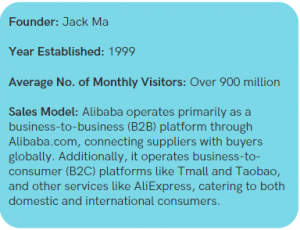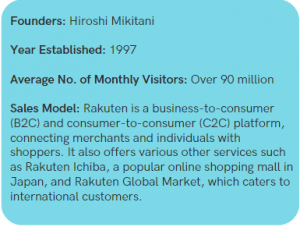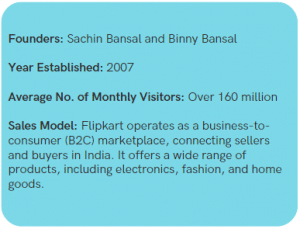Top 8 E-Commerce Platforms in Asia

Asia's e-commerce market is booming, driven by a massive population, increasing internet penetration, and growing consumer purchasing power. E-commerce platforms play a crucial role in connecting businesses and consumers, making it essential to understand the top players in the region.
This article explores the most influential e-commerce platforms in Asia, their founders, year of establishment, average monthly visitors, sales models, and their impact on the region's digital economy.
1. Alibaba Group
Alibaba Group, founded by Jack Ma, started as a small e-commerce venture in China. Over the years, it has evolved into one of the largest and most influential e-commerce conglomerates in the world. The company's flagship platforms, Tmall and Taobao, have become household names in China. 
Alibaba's success can be attributed to its innovative sales models, such as the group buying model and the integration of online payment system Alipay, which has made online shopping more accessible and secure for Chinese consumers.

The company's expansion into cloud computing, logistics, and financial services has further strengthened its position in the market. Moreover, Alibaba's relentless focus on technological advancements and data analytics has enabled it to understand consumer behavior better, driving personalized marketing and targeted promotions. As Alibaba continues to expand its footprint across Asia and beyond, it remains a dominant force in shaping the region's e-commerce landscape.
2. Tokopedia
Tokopedia's story is a testament to the tremendous growth of e-commerce in Southeast Asia, particularly in Indonesia, the region's largest economy. Since its inception, Tokopedia has played a vital role in empowering small businesses and entrepreneurs by providing them with a digital storefront to reach a broader customer base.
The platform's user-friendly interface, secure payment options, and efficient delivery system have contributed to its popularity among Indonesian consumers.

The company's commitment to promoting financial inclusion has been noteworthy, as it introduced innovative services like Tokopedia's digital payment platform, which has helped bring more Indonesians into the digital economy.
In addition, Tokopedia's strategic partnerships with logistics providers have enabled efficient and timely product deliveries, even to remote areas. As a homegrown success story, Tokopedia has become an essential player in the e-commerce ecosystem of Southeast Asia, particularly in Indonesia.
3. Rakuten
Rakuten is often referred to as the “Amazon of Japan” due to its widespread presence and diverse range of services. Starting as an online marketplace, Rakuten expanded its portfolio to include financial services, e-books, travel booking, and more, establishing itself as a comprehensive e-commerce ecosystem.
The company's focus on loyalty and rewards has been a key differentiator, offering its customers Rakuten Super Points for purchases, incentivizing repeat buying.

Rakuten's commitment to fostering a unique shopping experience has also set it apart from competitors.
Unlike many other platforms, Rakuten allows individual sellers to create personalized online storefronts, giving a more personalized touch to the shopping process. Moreover, the company's acquisition of international e-commerce platforms has enabled it to extend its reach beyond Japan and solidify its position as a global player in the e-commerce industry.
4. Shopee
Shopee has quickly risen to prominence as one of the leading e-commerce platforms in Southeast Asia and Taiwan. Its focus on mobile commerce and its user-friendly app interface have been instrumental in attracting a substantial user base.

Shopee's regular in-app promotions, flash sales, and gamified shopping experiences have created a sense of excitement among users, driving engagement and repeat visits.
Related Reading: Shopee vs. Lazada: Which Is Better?

The platform's commitment to localization and regionalization has also contributed to its success. Shopee tailors its services to suit the unique preferences of each market it operates in, reflecting the diverse cultural landscape of Southeast Asia. Furthermore, Shopee has invested heavily in building a robust logistics infrastructure to ensure efficient order fulfillment, even in remote areas.
5. Lazada
Lazada has emerged as a prominent e-commerce player in Southeast Asia, operating in multiple countries across the region. Following Alibaba's acquisition, the platform has benefited from its expertise in e-commerce and technological advancements. This partnership has allowed Lazada to tap into Alibaba's vast network of suppliers, enhancing its product offerings and improving the overall shopping experience for consumers.
Lazada's focus on building strong relationships with brands and merchants has been key to its success. By offering attractive incentives, marketing support, and access to a wide customer base, Lazada has become a preferred choice for businesses looking to expand their online presence in the region.

Additionally, Lazada has invested heavily in logistics and last-mile delivery solutions to ensure faster and more reliable deliveries, which are critical factors in providing a positive customer experience.
6. Flipkart
Flipkart is one of India's leading e-commerce platforms and has played a pivotal role in shaping the country's online retail landscape. The platform's early adoption of cash-on-delivery as a payment option, given the low credit card penetration in India, proved to be a game-changer, fostering trust and convenience among consumers.
Flipkart's innovative supply chain and logistics solutions have further contributed to its success in serving customers even in the most remote parts of the country.

The company's strategic acquisitions, such as Myntra and Jabong in the fashion segment, and its continuous focus on expanding its product categories have helped Flipkart maintain a competitive edge in the market. Moreover, Flipkart's introduction of its in-house brand products has not only driven margins but also provided consumers with affordable and quality alternatives.
7. Gmarket
Gmarket is a significant player in the South Korean e-commerce market, catering to a tech-savvy and fashion-conscious consumer base. The platform's success can be attributed to its efficient search and recommendation systems, providing personalized product suggestions to users, leading to increased engagement and sales.
South Korea's strong digital infrastructure and high smartphone penetration have contributed to Gmarket's growth, as it remains one of the primary channels for online shopping in the country.

The company's investment in cutting-edge technologies, such as AI-powered chatbots for customer support and mobile payment solutions, demonstrates its commitment to staying ahead in the competitive e-commerce market.
8. JD.com
JD.com is one of China's largest e-commerce platforms and has established itself as a formidable competitor to Alibaba. Its origins as a chain of physical electronics stores have helped JD.com build a robust logistics and supply chain infrastructure. The company's commitment to maintaining control over its delivery network has allowed it to offer reliable and fast delivery services, ensuring a positive customer experience.
JD.com's focus on authentic product guarantees and its zero-tolerance policy towards counterfeit goods have earned it the trust of consumers in China. The platform's strong emphasis on product quality and customer service has resonated with consumers, leading to a loyal customer base.

JD.com's investments in cutting-edge technologies such as drone delivery and AI-powered customer service have helped it stay at the forefront of innovation in the e-commerce industry.
Conclusion
E-commerce in Asia has experienced explosive growth in recent years, fueled by a combination of factors such as the region's large population, increasing internet and smartphone penetration, and rising disposable incomes. With over 2.8 billion internet users and counting, Asia has become the world's largest e-commerce market. Countries like China, India, Indonesia, and Japan are leading the way, accounting for the majority of online retail sales in the region.

The future of e-commerce in Asia looks promising, with projections indicating continued growth. As more consumers embrace online shopping and businesses tap into the digital marketplace, e-commerce sales are expected to surge further. The rise of mobile commerce, improved logistics networks, and the expansion of digital payment options are set to be key drivers of this growth.
Despite the region's overall growth, there are notable variations in e-commerce adoption across Asian countries. Differences in consumer behavior, regulatory environments, and cultural preferences influence the success of e-commerce platforms in specific markets. Localization strategies, such as offering region-specific products and payment methods, are crucial for businesses to thrive in diverse Asian markets.
Top e-commerce platforms like Alibaba Group, Tokopedia, Rakuten, Shopee, Lazada, Flipkart, Gmarket, and JD.com have driven Asia's digital economy. E-commerce's convenience and accessibility have transformed how consumers shop, with significant potential for further growth and innovation in the industry.
As technology advances and customer preferences evolve, e-commerce will continue to impact Asia's economy, driving digital transformation in the region.









